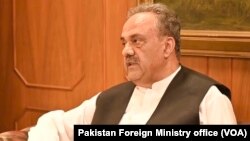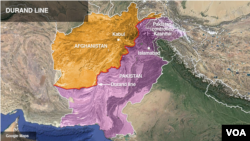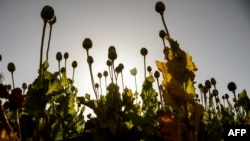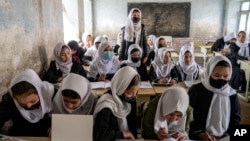Pakistan is optimistic Afghanistan's Taliban will effectively combat cross-border terrorism to emulate the kind of cooperation that U.S. President Joe Biden recently hinted at between the de facto Afghan rulers and Washington, a senior diplomat said Saturday.
Asif Durrani, Pakistan's special representative on Afghanistan Affairs, told VOA in an exclusive interview that the Taliban government had recently initiated certain moves to address his country's cross-border terror concerns and those of other neighbors, including China. But it is premature to speculate on the outcome, he cautioned.
Pakistan has experienced a dramatic surge in terrorist attacks since the Taliban returned to power in Kabul nearly two years ago. The violence has become a daily routine, killing hundreds of Pakistanis, including many security forces.
Islamabad maintains the attacks are being orchestrated by Afghanistan-based fugitive leaders and fighters of the Tehrik-i-Taliban Pakistan, or TTP, which is waging a deadly insurgency against the Pakistani state.
"It's a serious issue. But steps are being taken to neutralize the TTP. We should also understand that it will take a while, but the process has been initiated," Durrani said, responding to a recent Taliban announcement that TTP members were being moved away from Afghan areas bordering Pakistan.
"That is a step the Afghan government is taking, so we have to wait and see the results. It is now in the initial stages, so it would be too early to comment," said the Pakistan envoy. "But if this relocation of TTP can actually happen and lead to peace along our borders, it would be a significant development and we would welcome it," Durrani added.
He said Islamabad had opened talks with fugitive TTP leaders at the request of the Taliban to persuade them to cease violence, but the process broke down last year over "ridiculous" demands by the militants.
"Pakistan has exhausted the dialogue option; for them, the only way is to surrender and face the law," Durrani said. He added that Pakistani military operations had deprived the TTP of any territorial control and their relocation from border areas suggests they have now also become a "liability" for the Afghan Taliban.
The Taliban reclaimed power in Kabul in August 2021 when the United States and NATO allies chaotically withdrew all their forces and ended nearly two decades of involvement in the Afghan war.
The TTP, also known as the Pakistani Taliban, is an offshoot and close ally of the Afghan Taliban. It is designated as a global terrorist group by the U.S. The terrorist outfit sheltered the Afghan Taliban in Pakistan and provided recruits as they waged insurgent attacks on U.S.-led foreign troops and the former Afghan government before sweeping back to power two years ago.
"Comparatively, Afghanistan is now very peaceful but there are pockets of TTP, ETIM, and other groups that are a source of concern. Both Pakistan and China hope that the Afghan government will take practical measures," Durrani said. China has outlawed the ETIM, or the East Turkestan Islamic Movement, for carrying out terrorist attacks on its soil out of Afghan sanctuaries.
China told a U.N. Security Council meeting last month that terrorism remains a major challenge facing Afghanistan and urged the Taliban to take "firm and strong measures" against terrorist groups operating in the country.
"Terrorist forces, including ISIL-K, al-Qaida, and ETIM, are colluding with each other and jeopardizing the security of the country, the region, and the world at large," the Chinese envoy to the U.N. said in his speech to the meeting. He used an acronym for the Aghan branch of the Islamic State terrorist group.
"As President Biden has also alluded to the cooperation, which Afghan Taliban and American authorities have had in taking counterterrorism measures, the same expectation we have, and the process has started. Hopefully, we will have some positive results in the near future," Durrani told VOA.
Nearly two years after the American military withdrawal, Biden told reporters at the White House last week that the U.S. and the Taliban, two former adversaries, were cooperating to push out al-Qaida terrorists from the war-torn South Asian country.
"Remember what I said about Afghanistan? I said al-Qaida would not be there. I said it wouldn't be there. I said we'd get help from the Taliban," Biden told reporters. "What's happening now? What's going on? Read your press. I was right," he added without elaborating.
Last year, al-Qaida leader Ayman al-Zawahiri was killed by U.S. drone missiles in downtown Kabul, where, according to Washington, he was residing as a guest of the Taliban. The de facto Afghan authorities have also killed top Islamic State leaders in the country, reportedly with the help of American intelligence, though U.S. officials have not publicly acknowledged any such cooperation with the Taliban.
Poppy ban
The Taliban also have significantly reduced opium poppy cultivation in Afghanistan since regaining control of the country, a move Washington and other international stakeholders have praised.
"But those Afghan farmers, who are losing because of the [Taliban ban on] poppy cultivation and the substitution crops are not fetching them the profits they were earning from poppy earlier. I think they also need compensation and international community should help Afghanistan," Durrani said.
The Pakistani envoy noted his country's bilateral trade with Afghanistan has increased after the Taliban takeover and Afghan transit routes to landlocked Central Asian countries are also benefiting Islamabad.
"Our trade with Central Asian countries was close to $55 million before the American withdrawal but now it has registered close to $200 million, almost a rise of three times. Peace dividends are obvious. If Afghanistan becomes peaceful, it will become a South and Central Asia transit hub."
Dialogue with Taliban
Durrani insisted that dialogue and continued international engagement with the Taliban is the only way to reinforce the positive trends and address the continuing challenges in Afghanistan.
"Staying aloof or not engaging the Taliban, who are in power in Kabul right now, would not help. There is a realization, which is why the U.S. president and others have praised certain steps the Taliban have taken, including eradicating poppy," Durrani said. "Hopefully, other pending issues such as inclusivity, or for that matter, girls' education or women's employment, would also be addressed amicably."
The Taliban have imposed their strict interpretation of Islamic law or Sharia since re-establishing their control over Afghanistan. They have indefinitely closed girls’ schools beyond the sixth grade and ordered most female government employees — other than those working in the health sector and a couple of other departments — to stay home.
The United Nations and other non-governmental organizations have also been banned from hiring Afghan women employees. This week, the Taliban ordered women-run beauty parlors across the country to close within a month, claiming services offered at the facilities breached Sharia rules.
From the outset, the U.N. has denounced Taliban curbs on Afghan women's access to education and public life as unacceptable, saying they have made it "nearly impossible" for the new Kabul rulers to gain international legitimacy. The Taliban are also being pressed to give representation to all Afghan ethnic groups to run the country through an inclusive dispensation.
Taliban leaders defended their policies, saying they are aligned with Afghan culture and Sharia. They have rejected calls for easing restrictions on women as interference in the country's internal matters and insist their government "represents all languages, generations and regions" of Afghanistan.
Durrani said more than 700,000 Afghans have arrived in Pakistan since the Taliban took control of Kabul in August 2021. More than 120,000 of them have departed to the United States and other Western nations, while the fate of the rest is unknown, he added.
The displaced population mainly comprises Afghan families whose members worked for the U.S.-led international forces during their two-decadeslong stay in Afghanistan. They fled the country, fearing Taliban retribution.







